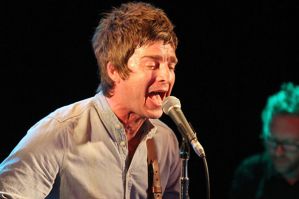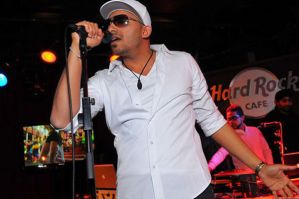Experts sing paeans to Saigal's genius at book relaunch

NEW DELHI: Speakers from all shades of the spectrum – politicians, musicologists, art connoisseurs – are unanimous that renowned singer Kundan Lal Saigal managed to render almost all his songs in classical music without formally receiving any training in the medium.
Speaking at a function held to mark his 63rd death anniversary (he died in 1947) in the capital on Monday, the speakers said Saigal's music had left a mark that may remain for decades since it appeared sweet and effortless.
Former information and broadcasting minister Vasant Sathe, who released the paperback edition of the book �Kundan' on the legendary singer-actor penned by former Doordarshan deputy director general Sharad Dutt whose film Saigal Aye Baso More Man Mein... was also screened on the occasion, said he had been touched by the humility of Saigal who had come to the college in which Sathe was studying and obliged the young students by singing all the songs they requested, for three hours in 1944. He said the book took readers and fans of Saigal to their childhood, as the film had done. He also observed that Saigal was the first actor singer of Indian cinema.
The function was organised by Saigal Sangeet Sarita in the Films Division Auditorium. The book had first been released in hardbound on Saigal's birth centenary on 4 April 2004 and went on to win the National Award in 2005 for best book on cinema. The programme commenced with a tribute to Dilip Sircar, son of B N Sircar who had first given a break to Saigal in 1932. Dilip, 81, died last week following illness.
The function was attended by Rabinder Chopra, grandson of KL Saigal and the singer's great grandson Nehul Chopra.
Speaking on the occasion, author Sharad Dutt said he had put an end to all misconceptions and incorrect facts, which have been circulating about Saigal. He said that his decade-long research on Saigal revealed that there was no truth in stories that Saigal was addicted to hard drinking and that he died of cirrhosis of liver due to drinking. The fact was that Saigal succumbed to diabetes, he said.
Sarita organising secretary Amarjit Singh Kohli said a feature film Amar Saigal... on the singer had been made by B N Sircar of New Theatres in 1955 (eight years after Saigal's death) on Saigal's life, in which the character of Saigal was played by G Mungheri. This is the only feature film ever made in the history of Indian Cinema on the life of any film actor or singer. He urged the government to name a flyover or road in the capital before the Commonwealth Games, to perpetuate the memory of the legend who had stayed in Delhi for some time in the 1930s.
Dr Ajit Singh Paintal, a former senior professor of the Faculty of Music, Delhi University, highlighted and analysed the ragas used by Saigal in his songs and concluded that his contribution to Indian music was unique. He also noted that Saigal never showed any strain while singing.
Veteran musicologist Dr Mukesh Garg who edits the 75-year old monthly magazine Sangeet..., said Saigal showed extraordinary talent in the use of the microphone in playback singing in Indian cinema. He laid down the technique of singing which was followed by all others. He said it was interesting that Saigal sang every song twice – once on the set (with the orchestra hiding behind bushes), and then for the gramophone record in the studio.
Former IPS officer R P Sinha, a musicologist, composer, singer and expert on Saigal, said that Saigal had himself created the myth that he did not learn music. He said that you cannot sing difficult compositions in Deepchandi taal such as Main Jo Dinan Ki Thori or Ho Ri Ho Brij Raj Dularey without learning the complexities of Gayaki. The fact was that he did not learn from one single Guru or Gharana but learnt, picked up and assimilated various musical styles from a large number of sources from Kashmir to Bengal, he said.
KL Saigal's first three films were Mohabbat Ke Aansoo, Zinda Lash, Subah Ka Sitara, all released in 1932 by New Theatres, Calcutta. Saigal acted in 36 feature films- 28 Hindi, seven Bangla and one Tamil Film Devdas.... In addition, he acted in a short comedy three-reeler titled 'Dulari Bibi' in 1933. His bhajan "Radhe rani de daaro na" in Pooran Bhagat(1933) created a sensation. His songs "Baalam aye baso more man mein" and "Dukh ke din" in Devdas (1935) made him the first superstar of Indian Cinema.His other films include Street Singer... (1938), Bhakta Soordas... (1942), Tansen... (1943), Shahjehan... (1946). His last film was Parwana... in 1947 with Suraiyya as his heroine. In all, Saigal sang 185 songs - 142 film songs and 43 non-film songs. In the film category, he sang 110 Hindi, 30 Bangla and two Tamil songs. In the non-film category, he sang 37 songs in Hindi and two songs each in Bangla, Punjabi and Persian languages.
Saigal was born on 4 April 1904 in Jammu and died on 18 January 1947 in Jalandhar. He was one of four brothers Ram Lal Sehgal, Hazari Lal Sehgal, Kundan Lal Saigal , Mohinder Lal Sehgal and one sister Shakuntala. He had one son named Madan Mohan and two daughters Nina Merchant and Bina Chopra. His wife Asha Rani expired in 1978. None of the children are now alive.














